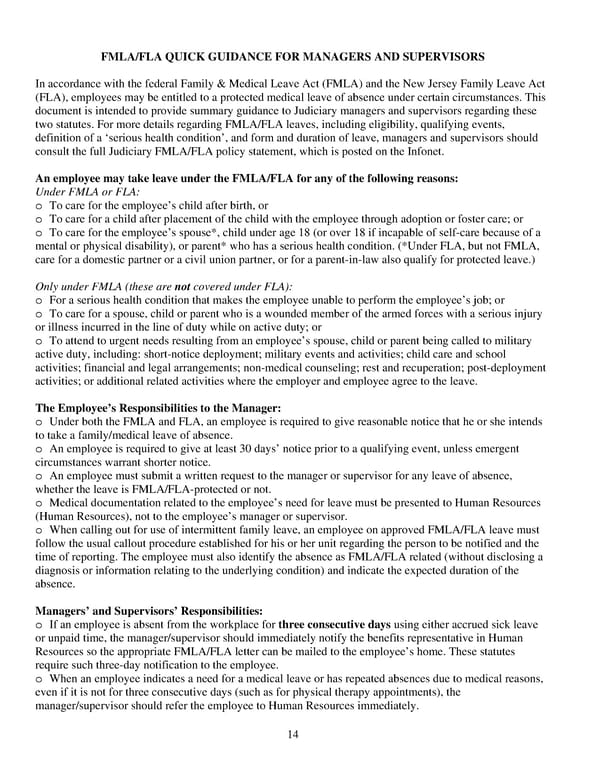FMLA/FLA QUICK GUIDANCE FOR MANAGERS AND SUPERVISORS In accordance with the federal Family & Medical Leave Act (FMLA) and the New Jersey Family Leave Act (FLA), employees may be entitled to a protected medical leave of absence under certain circumstances. This document is intended to provide summary guidance to Judiciary managers and supervisors regarding these two statutes. For more details regarding FMLA/FLA leaves, including eligibility, qualifying events, definition of a ‘serious health condition’, and form and duration of leave, managers and supervisors should consult the full Judiciary FMLA/FLA policy statement, which is posted on the Infonet. An employee may take leave under the FMLA/FLA for any of the following reasons: Under FMLA or FLA: o To care for the employee’s child after birth, or o To care for a child after placement of the child with the employee through adoption or foster care; or o To care for the employee’s spouse*, child under age 18 (or over 18 if incapable of self-care because of a mental or physical disability), or parent* who has a serious health condition. (*Under FLA, but not FMLA, care for a domestic partner or a civil union partner, or for a parent-in-law also qualify for protected leave.) Only under FMLA (these are not covered under FLA): o For a serious health condition that makes the employee unable to perform the employee’s job; or o To care for a spouse, child or parent who is a wounded member of the armed forces with a serious injury or illness incurred in the line of duty while on active duty; or o To attend to urgent needs resulting from an employee’s spouse, child or parent being called to military active duty, including: short-notice deployment; military events and activities; child care and school activities; financial and legal arrangements; non-medical counseling; rest and recuperation; post-deployment activities; or additional related activities where the employer and employee agree to the leave. The Employee’s Responsibilities to the Manager: o Under both the FMLA and FLA, an employee is required to give reasonable notice that he or she intends to take a family/medical leave of absence. o An employee is required to give at least 30 days’ notice prior to a qualifying event, unless emergent circumstances warrant shorter notice. o An employee must submit a written request to the manager or supervisor for any leave of absence, whether the leave is FMLA/FLA-protected or not. o Medical documentation related to the employee’s need for leave must be presented to Human Resources (Human Resources), not to the employee’s manager or supervisor. o When calling out for use of intermittent family leave, an employee on approved FMLA/FLA leave must follow the usual callout procedure established for his or her unit regarding the person to be notified and the time of reporting. The employee must also identify the absence as FMLA/FLA related (without disclosing a diagnosis or information relating to the underlying condition) and indicate the expected duration of the absence. Managers’ and Supervisors’ Responsibilities: o If an employee is absent from the workplace for three consecutive days using either accrued sick leave or unpaid time, the manager/supervisor should immediately notify the benefits representative in Human Resources so the appropriate FMLA/FLA letter can be mailed to the employee’s home. These statutes require such three-day notification to the employee. o When an employee indicates a need for a medical leave or has repeated absences due to medical reasons, even if it is not for three consecutive days (such as for physical therapy appointments), the manager/supervisor should refer the employee to Human Resources immediately. 14
 FMLA/FLA Quick Guidance for Managers and Supervisors Page 14 Page 16
FMLA/FLA Quick Guidance for Managers and Supervisors Page 14 Page 16